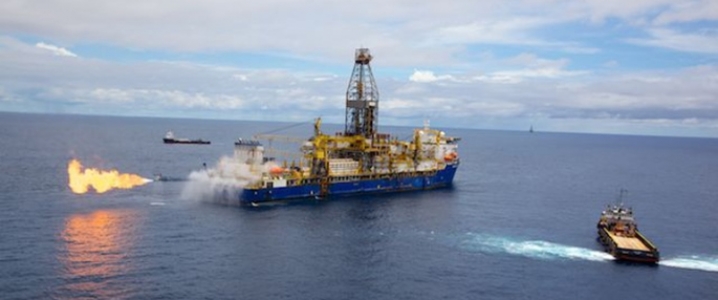The field of global liquefied natural gas (LNG) producers will get even more crowded going forward. U.S. oil major Exxon Mobil said Monday that it, along with project partners in Mozambique's Area 4 concession, had secured LNG off-take commitments for the Rovuma LNG project. This will lead to the all-important final investment decision (FID) in 2019, with production to begin in 2024. An FID is needed for capex intensive LNG projects before they can go forward to the funding then construction stages.
Partners in the Area 4 exploration and production concession in northern Mozambique include Mozambique Rovuma Venture, a joint venture (JV) between ExxonMobil, Italian-based energy giant Eni and Chinese state-run CNPC for a combined 70 percent share; along with Empresa Nacional de Hidrocarbonetos, South Korea's KOGAS and Portugal's Galp with a 10 percent share each, respectively.
Exxon Mobil said in a statement that LNG off-take commitments, secured from "affiliated buyer entities of the partners," are "subject to the conclusion of fully-termed agreements, which will be finalized and initialed in the next weeks, and the approval of the government of Mozambique.”
"These commitments are an important step forward for the Rovuma LNG project and provide a solid foundation for securing project financing," Massimo Mantovani, Eni's chief gas and LNG marketing and power officer added in a statement.
Swimming in gas
The Area 4 block contains deep water gas resources of 65 trillion cubic feet (tcf), and will be developed through the Coral FLNG and Area 4 onshore LNG projects. Exxon Mobil will operate the two onshore LNG projects, while Eni will continue to operate Coral LNG and upstream development. Each LNG production train will have a capacity of 7.6 million metric tons per annum (mtpa), for a total of 15.2 mtpa, making it one of the larger LNG production facilities. Related: $70 Oil Could Be Right Around The Corner
There are a number of significant developments from Exxon Mobil’s disclosure. Currently, Mozambique has its first LNG export project, a floating liquefied natural gas (FLNG) project, under construction and due to become operational by 2022, with the ExxonMobil project and another led by Texas-based oil company Anadarko planning FID’s for 2019. These two mega projects have an estimated combined cost of some $55 bn and would bring 28 mtpa of liquefaction capacity on stream by 2025, Paul Eardley-Taylor, head of oil and gas for Southern Africa at Johannesburg-based Standard Bank, said in November.
These three projects will have an estimated liquefaction capacity of 32 mtpa, placing Mozambique just behind Malaysia as one of the world’s top LNG exporters, while Qatar, Australia, the U.S. and Russia will lead the group of global LNG producers into the next decade.
Mozambique’s gas quandary
The problem, however, for Mozambique is not dissimilar from other developing countries that discovered vast oil or natural resources and quickly became rich, while not having diversified their economy enough to insulate against what is known as “the oil curse” or “resource curse.” Ironically, under such a scenario, these countries tend to experience less economic growth, less democracy, and even worse development outcomes in the long-term than those with fewer natural resources. In essence, the oil curse can best be described as the consequences of oil or resource wealth for poorly governed states.
This dynamic has played out in whole or in part in Nigeria, Angola, Myanmar, Papua New Guinea, Chad, Sudan and other countries, while Mozambique could easily join their ranks. The country has already been teetering on the brink of a major sovereign debt default, which has caused political, economic and security problems. Related: India Makes Breakthrough In Biofuel Development
Mozambique's debt quandary came about a decade after international creditors wrote off more than $6 bn worth of bad loans. Moreover, just two-and-a-half years ago the Mozambique government disclosed previously hidden government debt of another $1 bn. A DW report said in August that as Mozambique’s hidden debt scandal continues, groups are pushing for the secret loans triggered by the financial crisis, to be declared illegal. The report added that Mozambique’s economic woes were brought on by secret loans that were backed by the county's finance minister without parliamentary approval, which is required by the constitution.
Going forward
Mozambique's LNG development comes as a shift develops in global LNG markets, one that will see the current supply overhang of the super-cooled fuel pivot from a glut to one of undersupply, likely by the mid part of the next decade, if not earlier. Much of this is attributed to exorbitant LNG and gas demand growth in several regions, including the Middle East, South Asia (namely Pakistan, Bangladesh and India), EU members that are trying to diversify their gas dependency away from decades of Russian piped gas market dominance, Southeast Asia (Vietnam, the Philippines, Thailand, and Indonesia), and mostly China, whose gas demand is setting records as the country turns to gas to offset record high air pollution levels in its major urban centers. Per government mandate, at least 10 percent of China’s energy mix has to be comprised of natural gas, with further earmarks set for 2030 and beyond.
The trick for Mozambique is to both avoid the so-called resource curse as well as paying off massive debt while ensuring that gas revenue and the benefits of its gas boon can be beneficial not just to government coffers and foreign oil majors but to the country’s nearly 30 million population, most which are impoverished. If history is any indication of the future, Mozambique will have its hand’s full trying to not join the long line of countries falling victim to the ill-fated oil curse.
By Tim Daiss for Oilprice.com
More Top Reads From Oilprice.com:
- Why 2019 Could Start With An Oil Rally
- U.S. Shale Challenges OPEC’s Oil Dominance In Asia
- The New Oil Order


















